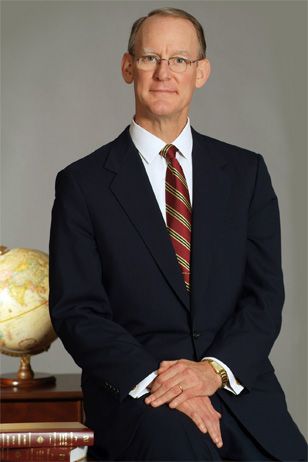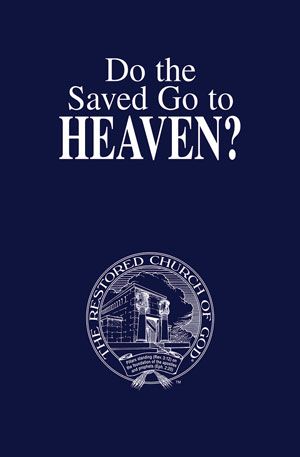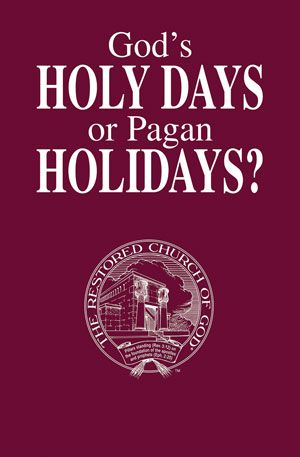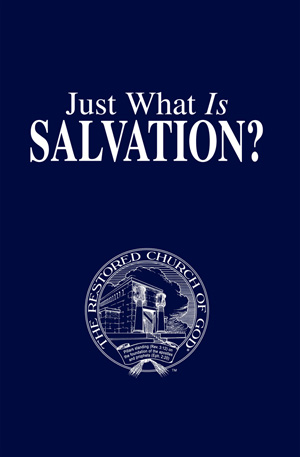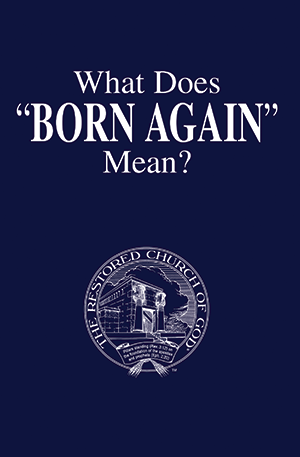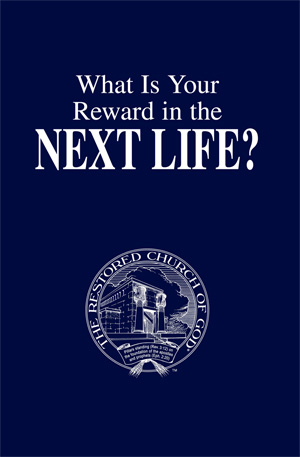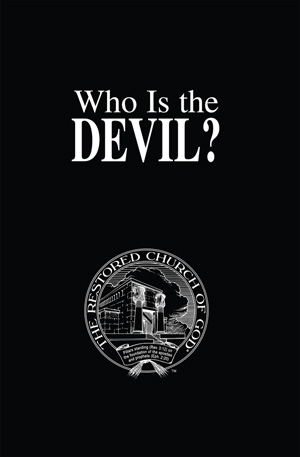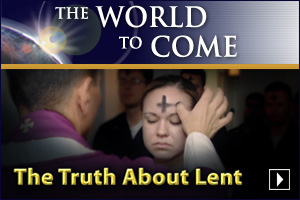The greatest single doctrine in the Bible is the knowledge of the true gospel. You are about to learn why.
Understand. There is only one correct gospel. All others are perversions designed by Satan to replace the incredible truth of its Message. It is this enormous understanding that Satan’s ministers always seem to pervert first.
At the very beginning of His ministry, Christ taught, “Repent you, and believe the gospel ” (Mark 1:15). But what is the true gospel? Is there more than one that God approves? The answers to these and other questions about the gospel are found in the Bible—and they are absolutely VITAL for you to understand. But the answers have remained hidden from the vast majority.
Much False Knowledge
Thousands of new books on religion are published each year in America! And there are over two thousand separate denominations and sects in America, as well! Yet, there has never been more confusion and disagreement among professing Christians, or in the world as a whole, about the true answers to life’s great problems. WHY? Why is there so much knowledge available, while at the same time so much ignorance of the truth about life’s BIG questions?
The answers to these questions have everything to do with the gospel!
The vast majority have been taught—and believe—that the gospel is merely about the Person of Jesus Christ. Certainly, Christ’s role is an extremely important subject, but He is not the gospel. The Bible shows that the name of Jesus Christ is preached in conjunction with the gospel. Again, His role is vital to Christianity, and must be understood, but He is not the gospel!
Some proclaim a “gospel of salvation” or “gospel of grace.” Others believe a “gospel of miracles” or a “social gospel” or a “gospel of foods” or “healing” or “faith.” Still others merely think of “gospel music” when they hear this word. These are all manmade ideas that ignore the truth of the Bible!
Let’s return to Mark 1, and notice verse 14: “Now after that John was put in prison, Jesus came into Galilee, preaching the gospel of the kingdom of God.” This is the gospel Jesus preached. And it was in the same context that He said, “Repent you, and believe the gospel.” Again, what gospel? The gospel of the “kingdom of God.” Verse 1 refers to this message when it states, “The beginning of the gospel of Jesus Christ.” Christ’s gospel was about the Kingdom of God—not something else! One must believe that gospel, not a counterfeit or substitute. The world simply does not know of this gospel!
Few comprehend. But why? Why do so few today grasp the awesome future of the Christian calling? Paul was inspired to explain: “But as it is written, Eye has not seen, nor ear heard, neither have entered into the heart of man, the things which God has prepared for them that love Him. But God has revealed them unto us by His Spirit: for the Spirit searches all things, yes, the deep things of God” (I Cor. 2:9-10). Without God opening the mind, it is impossible to understand any of the things of God. It is also impossible to even come to God (John 6:44, 65). Quite literally, this verse states that God’s purpose has never entered man’s thinking!
God, for His own marvelous purpose at this time, has opened the truth of the gospel to a very few—and has put them into His Church. The rest of the world remains blinded. Understand this! The devil does not want human beings to enjoy what is forever denied to him—membership in the God Family, which you will learn of.
Most will not wake up to the deception—the mass delusion—of a seduced “Christianity” that denies the plain truths of the Bible! God’s plan for mankind is staggering—incomparable to anything human beings have devised to replace it. The world ignores plain, clear scriptures found throughout God’s Word about the Kingdom of God. This book explains the astonishing truth that so many ignore—and reveals what can be your future!
Strong Warning Not to Pervert Gospel
This subject is so important that God inspired Paul to issue this warning to the Galatians then and to us now: “I marvel that you are so soon removed from Him that called you into the grace of Christ unto another gospel: which is not another; but there be some that trouble you, and would pervert the gospel of Christ. But though we, or an angel from heaven, preach any other gospel unto you than that which we have preached unto you, let him be accursed. As we said before, so say I now again, If any man preach any other gospel unto you than that you have received, let him be accursed” (1:6-9).
This is a very strong statement! A little later, Paul stressed his hope that the “truth of the gospel might continue with you” (2:5). So there is one true gospel—with all others false. You can now better understand Paul’s warning of Galatians 5:7-9, referenced earlier.
Although some assert that Paul taught a different or additional gospel, it is plain that he never did. Ironically, God used Paul to warn against ever allowing such false teaching by pronouncing a curse on any man, angel or even any apostle—“But though we [meaning, apostles]…preach any other gospel”—who choose to violate this command (1:8).
What a powerful scripture—and WARNING!
Paul explained that the apostles were entrusted by God to preserve the true gospel. Notice I Thessalonians 2:4: “But as we were allowed of God to be put in trust with the gospel, even so we speak; not as pleasing men, but God, which tries our hearts.” That is a responsibility not to be taken lightly. True ministers must always teach what God commands, not what pleases men (including Bible “scholars”). So any claim that Paul taught a different or second gospel (usually thought to be about Christ or of “peace”) is impossible. He would have literally been pronouncing a curse on himself!
Jesus Was Prophesied to Bring the Gospel
Jesus came as a newscaster carrying an announcement. Everywhere He went He made the same announcement concerning a coming supergovernment to be established at His Return.
When speaking to a group of listeners in the desert, Christ explained His purpose—His responsibility. Notice how He explained His commission: “And He said unto them, I must preach the kingdom of God to other cities also: for therefore am I sent” (Luke 4:43).
Matthew amplifies this: “And Jesus went about all Galilee, teaching in their synagogues, and preaching the gospel of the kingdom, and healing all manner of sickness and all manner of disease among the people” (Matt. 4:23). Christ’s job was to take the message of God’s Kingdom throughout the cities of Israel. He was “sent” for this purpose.
In the Old Testament, Jesus was prophesied to come as a messenger. Notice Malachi 3:1: “Behold, I will send My messenger [this is one called “Elijah” in Matthew 17:11, typed by John the Baptist], and he shall prepare the way before Me: and the Lord, whom you seek, shall suddenly come to His temple, even the MESSENGER [Christ] of the covenant, whom you delight in.”
Christ was the “messenger,” not the message. His message about God’s Kingdom is the very core—the centerpiece!—of the entire Bible.
Now compare the passage in Malachi with another in the New Testament: “The law and the prophets were until John [only the Old Testament scriptures had been preached until John the Baptist]: since that time the kingdom of God is preached, and every man presses into it” (Luke 16:16). Remember that, in Mark, Christ preached the “kingdom of God” and called it the gospel.
Satan, who knew that Christ was foretold to preach the Message that he hates, sought through King Herod to kill Him in His infancy. This is also why the devil sought to tempt Him in the wilderness (Matt. 4:1-11). He knew if he could be successful in either attempt, he could thwart God’s Plan and retain power over the nations of the world. We will also learn more of this later.
Meaning of “Gospel”
The word “gospel” is an old English word meaning “god spell” or good news. The word “kingdom” is also an old English term, simply meaning government. We may accurately say that Christ preached “the good news of the government of God.” We will learn the who, what, where, when, why and how of this good news and how it relates to the Bible’s greatest prophecy.
The word gospel is found 101 times in the Bible. Sometimes it is found alone, and sometimes “of the kingdom” follows it. Other times it includes “of the kingdom of God” or the equivalent phrase “of the kingdom of heaven.” Note that it says, “of heaven,” not “in heaven.” It is heaven’s Kingdom and there is a big difference. Just as Kingdom of God means God’s Kingdom, not the Kingdom in God, the same is true of the Kingdom of heaven or heaven’s Kingdom. This is critical to understand.
Throughout the New Testament, the word “kingdom” is found 27 times, “kingdom of God” 75 times and “kingdom of heaven” 34 times. All are clearly one and the same.
Now grasp this point. The subject of the Kingdom of God is not only the dominant theme in the New Testament, but it is also the dominant theme of the entire Bible. Yet, incredibly, most know little or nothing of it. The ministers of this world’s churches are ignorant of the true gospel and never preach about it. Therefore, virtually the whole world stands in complete ignorance of the single greatest truth in God’s Word. Incredible, but true!
Also, all who once learned it must constantly beware lest it slip away (Heb. 2:1).
The Apostles Preached the True Gospel
What evidence is there that other New Testament writers preached this same message? A great deal!
Peter preached the Kingdom. Notice: “For so an entrance shall be ministered unto you abundantly into the everlasting kingdom of our Lord and Savior Jesus Christ” (II Pet. 1:11).
So did the apostle James: “Hearken, my beloved brethren, Has not God chosen the poor of this world rich in faith, and heirs of the kingdom which He has promised to them that love Him?” (2:5).
Matthew’s account mentions the term “gospel of the kingdom” three different times. Here is another example, almost identical to 4:23, already quoted: “And Jesus went about all the cities and villages, teaching in their synagogues, and preaching the gospel of the kingdom, and healing every sickness and every disease among the people” (9:35).
In most of His parables, Christ taught the basics of the Kingdom of God. Matthew alone, mostly through parables, makes over fifty references to the coming Kingdom of God.
Luke records that Christ commissioned His disciples to preach this same message: “Then He called His twelve disciples together…And He sent them to preach the kingdom of God” (9:1-2). Soon after, He sent seventy others to preach, and they also carried the message of the “kingdom of God” (10:1, 9).
John records Christ’s words before Pontius Pilate on the night He was betrayed. This is an important clue to comprehend. Christ said, “My kingdom is not of this world [this present society]” (18:36). We will discover the details later of exactly how God’s government will be established on Earth.
Recall that Philip, a deacon, preached the Kingdom to the Samaritans (Acts 8:12). Notice that he preached separately the Kingdom and Christ: “But when they believed Philip…concerning the kingdom of God, and the name of Jesus Christ, they were baptized, both men and women.”
Philip not only preached the gospel of the Kingdom, but he also differentiated it from the teaching about Jesus Christ. Take time to read this entire account. Remember, the messenger is not the message. Christ is not the gospel. However, He does stand directly alongside it and will rule the entire Earth when the Kingdom is established.
So then Luke, the writer of Acts, further differentiates between preaching about the Kingdom of God and preaching about Jesus Christ! While both are vitally important, they are clearly two separate subjects!
We have addressed how some claim Paul preached a “different gospel.” These are obviously unaware that it was Paul whom God used to pronounce a curse on anyone who did this (Gal. 1:8-9). We have seen that Paul preached the Kingdom of God. However, you will notice two verses in Acts, which show that he did not neglect the second subject of Christ’s role in the process of salvation.
First, let’s establish that Paul preached God’s Kingdom to the Gentiles. Acts 19:8 states, “And he went into the synagogue, and spoke boldly for the space of three months, disputing and persuading the things concerning the kingdom of God.” There are many places in his epistles where Paul taught the Kingdom to various Gentile churches. His message was always the same, continually preaching and referring to the Kingdom of God.
Examine this from Acts 20:25: “I have gone preaching the kingdom of God…repentance toward God, and faith toward our Lord Jesus Christ” (vs. 21). This account makes clear that Paul preached the same gospel—also alongside the role of Christ—to both Jew and Gentile. (The Ephesians were primarily Gentile converts.)
Next, notice chapter 28:30-31: “And Paul dwelt two whole years in his own hired house, and received all that came in unto him, preaching the kingdom of God, and teaching those things which concern the Lord Jesus Christ.” Like Philip, Paul understood that the gospel and who was Jesus Christ were two separate subjects.
Finally, consider one more passage where Paul made a distinction between the gospel and the Person of Christ, by briefly referencing again II Corinthians 11:4: “For if he that comes preaches another Jesus, whom we have not preached…or another gospel which you have not accepted, you might well bear with him” (the margin more correctly renders this last phrase “with me”). Paul urged the Corinthians to reject false teachers and to hold to what he had taught them. He plainly distinguished the teaching of a false Jesus and a false gospel as two separate errors.
Again ask yourself: If Christ is the gospel, then why did Paul (four times) and Philip speak of them as two separate matters?
Every Old Testament Prophet Preached the Kingdom
Many have supposed that the gospel is exclusively a New Testament message. Nothing could be further from the truth! The Bible is literally filled with places, Old and New Testament, which describe various aspects and prophecies about the Kingdom of God.
Let’s consider an amazing statement by Peter found in Acts 3:19-21: “Repent you therefore, and be converted, that your sins may be blotted out, when the times of refreshing shall come from the presence of the Lord; and He shall send Jesus Christ, which before was preached unto you: Whom the heaven must receive until the times of restitution of all things, which God has spoken by the mouth of all His holy prophets since the world began.”
Notice that Peter refers to the Coming of Christ—“the presence of the Lord” (vs. 19), with verse 20 stating that God “shall send Jesus Christ.” Verse 21 describes God’s Kingdom as the “restitution of all things.” Peter stated that this “restitution” (Christ establishing His Kingdom) is something that “God has spoken by…ALL His holy prophets since the world began.”
This is a stunning statement! But is it true?
Could God have actually used every one of His prophets to announce His Kingdom? Why do Bible scholars and religionists ignore this—or even reject it outright? Let’s survey the Old Testament.
The Pre-Flood Preachers
Jude wrote that “Enoch [Noah’s great grandfather]…prophesied…saying, Behold, the Lord comes…to execute judgment upon all” (vs. 14-15). This obviously refers to Jesus Christ returning to establish a government, ruling ALL nations.
In II Peter 2:5, Noah is referred to as the “eighth…preacher of righteousness.” Jude wrote that Enoch was the “seventh from Adam.” Hence, Noah, next to follow him, is referred to as “the eighth.” Beginning with Abel, and including Enoch, there were seven men who previously held this role before Noah. These eight men’s lives spanned the entire period between Adam and the Flood, and they all preached the same message.
Careful review of Jude reveals that Enoch also preached about sin and righteousness. While much could be said about this sixteen-and-a-half-century period, suffice to say, all of these men spoke the same message. Remember, Peter said, “…since the world began.”
Who else preached of God’s Kingdom?
Abraham, Moses, Samuel and David
Is there evidence that the gospel was preached during the period following the Flood?
In Genesis 12:3, God said to Abraham, “In you shall all families of the earth be blessed.” This is also referenced in Galatians 3:8, but phrased a little differently: “…in you [Abraham] shall all nations be blessed.” This same verse states that the gospel was “preached before unto Abraham.”
This is fascinating! Not only did Abraham have the gospel preached to him (almost certainly by Melchizedek—Christ), but it was also preached in Genesis, through Moses’ writings, about Abraham! Now consider. How could all of the nations of the Earth be blessed unless Christ will have established His government on Earth?
While Moses was not a “preacher of righteousness” or an apostle, he was a prophet and a judge, and the first man God raised up to lead Israel. Perhaps you have never thought of Moses as one who preached the gospel. Yet, the Bible reveals that he did, to ancient Israel, when they were in the wilderness. We saw that Genesis 12:3 refers to the gospel, as does Numbers 24:17-19, and both were recorded by Moses.
Acts 3:22 plainly states Moses foretold that God would raise up a prophet (Deut. 18:15) to preach the Kingdom of God to the whole world (Acts 3:23) before Christ’s return! Most are only familiar with Moses leading Israel out of Egypt, and are completely ignorant of how God used him in this way.
Hebrews 3:9 and 4:2 also demonstrate that Moses preached the gospel to ancient Israel. “For unto us was the gospel preached, as well as unto them [ancient Israel]” (4:2). These verses, with Acts 3, show that this included the period all the way up to—and through—Samuel!
Acts 3:24 references Samuel as also having preached the gospel. Notice: “Yes, and all the prophets from Samuel and those that follow after, as many as have spoken [meaning everyone], have likewise foretold of these days [the Coming of Christ and God’s Kingdom].” These are clear and powerful statements. They cannot be glossed over. Make yourself take a moment to reflect on what you have read. This verse declares, “ALL God’s prophets…as many as have spoken…foretold of these days.”
Finally, while virtually everyone knows David was a king, almost no one understands that he preached the Kingdom of God. In Psalm 67:4, he wrote, “…for You [the Lord] shall judge the people righteously, and govern the nations upon earth.” This statement is a plain reference to God’s coming government.
Isaiah, Jeremiah, Ezekiel and Daniel
The prophet Isaiah made even more plain statements about God’s Kingdom, about how it would appear and bring peace to all nations on Earth. He also made clear that God’s Kingdom involves government. Notice: “For unto us a Child is born, unto us a Son is given: and the government shall be upon His shoulder: and His Name shall be called Wonderful, Counselor, The Mighty God, The Everlasting Father, The Prince of Peace. Of the increase of His government and peace there shall be no end, upon the throne of David, and upon His kingdom, to order it, and to establish it with judgment and with justice from henceforth even forever” (9:6-7).
This prophecy is so obvious that it needs no further explanation!
The prophet Jeremiah foretold, “Behold, the days come, says the Lord, that I will raise unto David a Righteous Branch [Christ], and a King shall reign and prosper, and shall execute judgment and justice in the earth. In His days Judah shall be saved, and Israel shall dwell safely: and this is His Name whereby He shall be called, THE LORD OUR RIGHTEOUSNESS” (23:5-6; also read vs. 7-8).
As with Isaiah, these verses need no further explanation. Jeremiah gives a plain description of events that could only be described as the period after God’s Kingdom has come to Earth.
The book of Ezekiel describes a time when God will gather His people from coming captivity. This is the period immediately after the time of Jacob’s trouble—the prophesied time of calamity on the modern descendants of ancient Israel. Now notice: “For I will take you from among the heathen, and gather you out of all countries, and will bring you into your own land” (36:24).
The next ten verses describe a period of rebuilding and prosperity that can only happen after Christ’s Kingdom has been established in Israel. Take time to read them.
Daniel wrote this: “And in the days of these kings shall the God of heaven set up a kingdom, which shall never be destroyed and the kingdom shall not be left to other people, but it shall break in pieces and consume all these kingdoms, and it shall stand forever” (2:44).
Did this prophet preach the Kingdom of God? The Bible answers yes—and we will see later that he did so in many other places!
All the Minor Prophets
It can be shown that, in one way or another, all those often identified as the “Minor Prophets” preached the gospel of the Kingdom of God. (Jonah is a possible exception.) Remember, seeing the phrase “the gospel of the kingdom of God” is not the only way of describing the gospel! Genesis 12:3 and Galatians 3:8 have already shown this.
Review the following verses. In each case, you will find that they refer, directly or indirectly, to the Kingdom of God: Hosea 2:16, 19; 3:5; Joel 2:21-27; Amos 9:11-15; Obadiah 21; Micah 4:1-3; Habakkuk 2:14; Zephaniah 3:14-20; Haggai 2:7; Zechariah 14:1-3, 8-9; Malachi 3:1-3.
After reading these scriptures, it is obvious that Peter was right, and that “God has spoken by the mouth of all His holy prophets since the world began…the restitution [restoration] of all things,” which can only occur with the coming of God’s government to Earth.
It is crucial to make one final point. Acts 3:21 states, “God has spoken by the mouth of…” The gospel of the Kingdom is a message from God.
It should be clear that it is GOD who speaks through whatever kind of servant He is using—prophet, patriarch, judge, deacon, preacher of righteousness, king, pastor, evangelist or apostle! If a man was truly His servant, God always spoke this same message through him—“since the world began”!
(To understand exactly how God’s Kingdom will be established on Earth—only now fully understood!—read my booklet How God’s Kingdom Will Come – The Untold Story!)
Is There a Separate Gospel of Jesus Christ?
As mentioned, Mark 1:1 speaks of “The beginning of the gospel of Jesus Christ.” Let’s ask: Is the “gospel of Jesus Christ” a different—a second—gospel? Did Paul forget that there was another gospel besides the one about the Kingdom?
The answer is an emphatic “No!” But most preachers teach that the gospel of Jesus Christ is about Christ, also claiming that He is the Kingdom of God and that the gospel of the Kingdom is Christ. We have seen this is false, and completely unbiblical! The gospel of Jesus Christ is His gospel—His message about the Kingdom of God!
We have seen that Jesus was a Messenger sent from God with an ANNOUNCEMENT! It was not about Himself—it was about God’s Kingdom coming to reign over the entire Earth. In John 12:49-50, Jesus said, “For I have not spoken of Myself; but the Father which sent Me, He gave Me a commandment, what I should say, and what I should speak. And I know that His commandment is life everlasting: whatsoever I speak therefore, even as the Father said unto Me, so I speak.” It should now be clear that Jesus functioned as a messenger—as a spokesman for the Kingdom of God.
In John 14:24, Jesus said, “The word which you hear is not Mine, but the Father’s which sent Me.” Christ brought the Father’s message—not His own. This should now be absolutely clear. Remember, He stated in Luke 16:16 that “The law and the prophets were [preached] until John: since that time the kingdom of God is preached.”
That is what this Work is doing today. Through this book, and many others, the truth of God’s Kingdom is being preached to you and to millions of others.
The Kingdom of God Is Coming
Make no mistake! With world conditions nearing the final crises, no human could ever bring about a single, world-ruling government that would work. Jesus Christ will soon return and establish his Kingdom.
The disciples did not understand when Christ would establish God’s government on Earth. He had to explain to them through use of a parable. Notice: “And as they heard these things, He added and spake a parable, because He was nigh to Jerusalem, and because they thought that the kingdom of God should immediately appear” (Luke 19:11). This long parable explains that much time would pass before it came.
Before His ascension into heaven, in Acts 1, after a series of meetings with His disciples, Christ met one last time with them. Until the very end, He continued to expound the Kingdom of God to them. But they remained confused about when it would be established: “Until the day in which He was taken up…[He was] speaking of the things pertaining to the kingdom of God…When they therefore were come together, they asked of Him, saying, Lord, will You at this time restore again the kingdom to Israel?” (vs. 2-3, 6).
Christ explained, “It is not for you to know the times or the seasons…” (vs. 7). We cannot today know exactly when it will come, but we can know that it is close.
Now notice Daniel 7:18: “But the saints of the Most High shall take the kingdom, and possess the kingdom forever, even forever and ever.” Then, verse 22 states, “Until the Ancient of Days came, and judgment was given to the saints of the Most High; and the time came that the saints possessed the kingdom.”
Finally, notice verse 27: “And the kingdom and dominion, and the greatness of the kingdom under the whole heaven, shall be given to the people of the saints of the Most High, whose kingdom is an everlasting kingdom, and all dominions [rulers] shall serve and obey Him.”
Daniel knew that the saints will one day reign on Earth with Christ!
Jesus’ first recorded sermon, called “The Sermon on the Mount,” states that “the meek shall inherit the earth” (Matt. 5:5). Actually, Christ was quoting David, who had recorded this statement in Psalm 37:11—another place where David proclaimed the gospel. The wording there is precisely the same. Other prophecies also demonstrate that David himself will one day rule over all the tribes of Israel within the Kingdom of God.
Notice three separate verses in Revelation. Christ is quoted through John, saying, “To him that overcomes will I grant to sit with Me in My throne, even as I also overcame, and am set down with My Father in His throne” (3:21). Also 2:26-27: “And he that overcomes…to him will I give power over the nations: and he shall rule them with a rod of iron.” Finally, “and has made us unto our God kings and priests: and we shall reign on the earth” (5:10).
Has organized religion told you about any of these verses? Almost certainly not. Yet they have been in the Bible for thousands of years.
No wonder that when Christ was on trial for His life, He added more to one of His statements quoted earlier in the book, “My kingdom is not of this world: if My kingdom were of this world, then would My servants fight, that I should not be delivered to the Jews: but now is My kingdom not from here” (John 18:36). In this exchange, Pilate had asked Him, “Are you a king then?” Christ answered, “To this end was I born, and for this cause came I into the world…” (vs. 37).
Jesus fully understood that He was born to be a King!
Christ To Be a King
Christ’s First Coming was to be a great event. Isaiah prophesied of His birth to a virgin: “Therefore the Lord Himself shall give you a sign; Behold, a virgin shall conceive, and bear a Son, and shall call His name Immanuel” (7:14).
Before Jesus’ birth, an angel appeared to Mary to explain God’s purpose and what was about to happen to her: “And in the sixth month the angel Gabriel was sent from God unto a city of Galilee, named Nazareth, To a virgin…Mary” (Luke 1:26-27).
Beginning in verse 30, Gabriel explains more about Christ and how He would eventually rule from the throne of David. Notice: “And the angel said unto her, Fear not, Mary: for you have found favor with God. And, behold, you shall conceive in your womb, and bring forth a Son, and shall call His name JESUS. He shall be great, and shall be called the Son of the Highest: and the Lord God shall give unto Him the throne of his father David: and He shall reign over the house of Jacob forever; and of His kingdom there shall be no end” (vs. 30-33).
Christ was never in doubt about His life’s mission and purpose. This is why He continually preached the Kingdom of God everywhere He went.
Isaiah spoke in more detail about how God’s Kingdom would spread around the Earth, eventually encompassing all nations: “And it shall come to pass in the last days, that the mountain of the Lord’s house shall be established in the top of the mountains, and shall be exalted above the hills; and all nations shall flow unto it. And many people shall go and say, Come you, and let us go up to the mountain of the Lord, to the house of the God of Jacob; and He will teach us of His ways, and we will walk in His paths: for out of Zion shall go forth the law, and the word of the Lord from Jerusalem. And He shall judge among the nations, and shall rebuke many people: and they shall beat their swords into plowshares, and their spears into pruninghooks: nation shall not lift up sword against nation, neither shall they learn war any more” (2:2-4).
This identical prophecy is repeated for emphasis in Micah 4:1-3. These passages foretell that God’s Kingdom will spread around the world—beginning with the modern nations descended from Israel. This is why one of Christ’s parables likened the Kingdom to leaven (Luke 13:20-21), which always spreads until it fills its host. The overarching purpose for your life is to participate in the future spreading of God’s government.
In front of the United Nations Building is the sculpture of a large man forging a plow from a sword. I have seen it hundreds of times, because I conducted church services across the street from that spot for several years. But no one seems to any longer take notice of, or even believe, the amazing prophecy depicted by this famous sculpture.
Jesus Christ came to be a KING who will one day REIGN on the Earth. Suffering, misery, unhappiness and all the world’s troubles and evils will eventually disappear—and world peace will literally “break out,” along with supreme happiness, harmony, prosperity and abundance for all nations. No human government has ever been able to bring these things to even one country on Earth. This is the core of the very gospel that Jesus brought.
Do you believe it? Will you believe it?
The Kingdom of God Must Still Be Preached Today
In the Matthew 24 (and 25) Olivet Prophecy, Christ was asked about those events that would be the sign of His Coming and the end of the world (age). He answered that a number of different trends and conditions would occur first.
One event preceding Christ’s Return in power and glory is described in verse 14: “And this gospel of the kingdom shall be preached in all the world for a witness unto all nations; and then shall the end come.” The true gospel was foretold to be preached until “the end come.” This plainly means that someone will be preaching it in our present age.
Remember, the end has not yet come. Therefore, The Restored Church of God is continuing this commission, boldly preaching this greatest of prophetic truths. The arrival of God’s Kingdom is sure—it is certain! When it comes, you too can be a part of it.
7,000-year Plan
Cut off from God by sin (Isa. 59:1-2), mankind has believed the lies of the god of this world for 6,000 years. The span of God’s plan with men encompasses 7,000 years, followed by additional phases beyond that time. Few have understood this. Many have correctly understood at least some little of the verses describing Christ’s coming 1,000-year Reign (Rev. 20:4-6). But they know nothing of God allotting 6,000 years, or six millennial days of a “seven-day week,” to man’s rule, under Satan, prior to the seventh 1,000-year “day.” We are very near the end of the “sixth day.”
Let’s understand! The Bible states, “But, beloved, be not ignorant of this one thing, that one day is with the Lord as a thousand years, and a thousand years as one day” (II Pet. 3:8; Psa. 90:4). Of course, most are “ignorant” of almost everything that the Bible teaches.
But you can know!
Man (under the invisible sway of Satan) has been given six “days,” or 6,000 years, to try his own ways, governments, religions, philosophies, value systems, codes of conduct and forms of education. Under the influence of Satan, he has practiced sin and disobedience to God’s commands for all this time. He has then tried to treat all of the ill effects this has brought on, instead of the cause, which is the breaking of God’s commandments. God is allowing humanity to learn hard, bitter lessons. The masses, who have never known the precious truth of God, must learn that their own ways do not work!
Jesus Christ was born to be a King who will rule all nations of the Earth forever with the help of other spirit-composed kings: “And out of His mouth goes a sharp sword, that with it He should smite the nations: and He shall rule them with a rod of iron…and on His thigh a name written, KING OF KINGS, AND LORD OF LORDS” (Rev. 19:15-16).
Has anyone ever told you of these passages? I never learned of them or even heard of them in the church of my youth—and yet, here they are, written with unmistakable clarity of meaning for all who will heed.
Kingdom of God Explained
Matthew 6:33 states, “But seek you first the kingdom of God, and His righteousness…” If you seek something first in life, you had better know exactly what you seek.
The main purpose in this chapter is not to explain in detail the Kingdom of God. (This will be done later.) It is to explain the definition of the true gospel and mankind’s awesome potential.
So let’s understand. The word “kingdom” simply means government. Of course, you cannot have a government without a nation to govern. Therefore, a kingdom is at least one nation with a government.
There are four necessary components to any kingdom: (1) Land, property or territory—however large or small. In other words, one must have a specific and definite set of boundaries that constitutes the size of the kingdom; (2) a ruler, king, monarch or governor leading the government; (3) people or subjects living within the territory; and (4) a system of laws and rules along with a basic structure of government. No kingdom is complete without all of these fundamental elements.
But how does this apply to God’s Kingdom? Most do not understand the most basic elements of the Kingdom of God. Is it a literal, physical place on Earth, with people and laws, presided over by a ruler? Many believe the Kingdom is merely something in the hearts of men. Others believe that it is wherever you find a particular church. Still others believe that it is Jesus Christ Himself. Some believe that it is here on Earth now and others believe that it is yet to come, but do not understand—have no idea—how this will occur.
We may ask: How does one actually enter the Kingdom of God?
One Must Be Born Again to Enter the Kingdom
Paul wrote that Christ is “the firstborn from the dead” (Col. 1:18), and also “the firstborn among many brethren” (Rom. 8:29). When connected, these verses show that Jesus is merely the firstborn from the dead, with many others to follow. But when, and into what, will these others be born?
In John 3:3, Christ said to Nicodemus, “Verily, verily [this means truly, truly], I say unto you, Except a man be born again, he cannot see the kingdom of God.” In verse 6, Christ continues, “That which is born of the flesh is flesh; and that which is born of the Spirit is spirit.” Simply believe the plain meaning of this verse. One must become spirit to see the Kingdom of God.
Paul taught, “flesh and blood cannot inherit the kingdom of God” (I Cor. 15:50). The next two verses explain that the resurrection will occur at the last trumpet, when “the dead shall be raised incorruptible, and we shall be changed.”
This is when the resurrection of the dead will occur. Do not misunderstand this climactic event, more carefully explained much later. Suffice to say here, people who were once fleshly human beings will be changed into spirit—will be born again—and enter into the Kingdom of God. No physical people can enter this Kingdom.
John 4:24 states, “God is a Spirit.” Under the Father, Christ leads His Kingdom, which is composed of spirit beings. At His Return, Christ, as a member of the God Family, will have many younger “brothers and sisters,” who will have qualified to rule with Him.
Think of it this way: There is a plant kingdom, an animal kingdom, human kingdoms and an angelic kingdom. There is also the Kingdom of God.
Now notice Genesis 1:26: “And God said, Let us make man in our image, after our likeness.” When referring to themselves, the One speaking says, “Us,” “Our” and “Our.” This is proof that there is more than one Being in the Godhead—there are presently two! In this scripture, the Hebrew word for God is Elohim. This is a uniplural term like group, team, committee or family. All of these represent one entity, comprised of several members or persons.
Thus, we will see that the Bible teaches that there is one God, composed of two Persons—the Father and Christ—with many more persons to be added later. The first great time when God will add more sons to His Family is when Christ’s Kingdom is established throughout the Earth. But entering God’s Kingdom will not be automatic for anyone.
There Are Conditions to Entering the Kingdom
We read in several places where Christ said only those who overcome will inherit the Kingdom and rule with Him. There is more to being in the Kingdom of God than just desiring it. There are qualifying conditions that must be met.
Jesus said to a young rich man who inquired about eternal life, “…if you will enter into life, keep the commandments” (Matt. 19:17). He explained that one must keep the Ten Commandments to be saved, and specifically cited five of them.
Now what is sin? Since committing it results in death (Rom. 6:23), should you not know what it is? I John 3:4 records, “Sin is the transgression of the law.” This is the same law that the young rich man was told he must obey to inherit eternal life.
Many claim to be Christian—to be followers of Christ. They claim to “believe on Christ” and claim to be “seekers of truth,” when they do not want the real truth of the Bible at all. Notice this long exchange that Jesus Christ had with the Pharisees: “Then said Jesus to those Jews which believed on Him [these were “believers”], If you continue in my word, then are you My disciples indeed; and you shall know the truth, and the truth shall make you free…but you seek to kill Me, because my word has no place in you…But now you seek to kill Me, a man that has told you the truth, which I have heard of God…If God were your Father, you would love Me: for I proceeded forth and came from God…Why do you not understand My speech? Even because you cannot hear my word…and because I tell you the truth, you believe Me not [yet it says they believed “on” Him]…And if I say the truth, why do you not believe Me?” (John 8:31-32, 37, 40, 42-46). Jesus continues in the account by bluntly indicting those who would claim to be Christians when they are really “of (their) father the devil.”
Many assert that they “know Jesus” when they know virtually nothing of the true Christ of the Bible. As He said, they literally “cannot hear” Christ’s words—the truth—though they may think that they do: “He that says, I know Him, and keeps not His commandments, is a liar, and the truth is not in him” (I John 2:4). The world is filled with hundreds of millions of such “Christians,” professing a Jesus, but ignorant of the truth.
Many who are not practicing Christianity find their way into the true Church. But eventually they all leave. John continued, “They went out from us, but they were not of us; for if they had been of us, they would no doubt have continued with us: but they went out, that they might be made manifest that they were not all of us” (vs. 19). I have seen this too often. Many seem to only believe “on” Christ, not really believing Him—that is believing what He said, and said to DO!
Recall Christ’s words in Mark 1:15: “repent you, and believe the gospel.” Repentance is from sin (Acts 3:19). A Christian is one who has turned from—repented of—his sins, and been baptized (2:38) and converted (3:19). Through a lifetime of overcoming sin, the Christian qualifies for (though he can never earn) salvation and spiritual birth into the Kingdom of God.
Your Awesome Potential
Recall that God said that He made human beings in His “image” and “likeness.” This verse means what it says. God created you to become “like” Him in every way. Through His Spirit entering the mind of each of His newly converted children, a literal, brand new spirit life is begotten. At that moment, a tiny spirit-begotten “embryo” comes into existence, ready to grow and develop in overall spiritual appearance, in a sense we could say, first to “fetus,” then to birth.
Both the Old and New Testaments make this point absolutely plain! While many have some vague understanding that Christians might, in some way, be “sons of God,” none ever consider this: “Beloved, now are we the sons of God, and it does not yet appear what we shall be: but we know that, when He shall appear, we shall be like Him; for we shall see Him as He is” (I John 3:2). Comprehend this staggering knowledge, unknown to almost all who consider themselves Christian! We will one day have the very likeness of Jesus Christ. Romans 8:16 states that we are “children” of God and “heirs” with Christ.
King David also understood this a thousand years earlier when he wrote, “As for me, I will behold Your face in righteousness: I shall be satisfied, when I awake, with your likeness” (Psa. 17:15). Incidentally, this verse dispels the delusion of the “beatific vision” idea made popular by the universal church—that people will not actually see God’s face in the afterlife. David understood that we will see God—and face to face. So did John. Both knew that at the Resurrection—when we “awake”—we will be exactly like God, in form and character.
So then, God is actually reproducing Himself in human beings who have received His Holy Spirit. He is creating children that will resemble Him in every way!
But Peter wrote that Christians must “grow in grace, and in the knowledge of our Lord and Savior Jesus Christ” (II Pet. 3:18). Christians are to—and must—grow in this lifetime. In order to be given divine authority and power, as joint-heirs with Christ, they must qualify, through the building of God’s holy, righteous character in their lives.
Paul explained that the role of faithful ministers in the Church is to feed the flock. Jesus said, “I will build My Church” (Matt. 16:18). It is the Church—THAT Church—which is “Jerusalem above…the mother of us all” (Gal. 4:26; Heb. 12:22-23). Like any mother, the Church nurtures and feeds her children—and she has been doing this for 2,000 years. (More about the Church’s role as our mother will be explained in Chapter Ten.)
An Astonishing Scripture
The book of Hebrews reveals God’s awesome purpose with crystal clarity. The context begins in Chapter 1. Watch the picture of salvation unfold.
First, understand that God created angels to be “ministering spirits” to assist the “heirs of salvation” (vs. 14). This is their role within God’s Plan. Angels are not offered membership in the Family of God. This is why Satan (as a fallen angel) so hates the idea that puny, little, fleshly men can receive what he has never been offered nor can achieve.
Paul quotes two places in the Psalms: “For unto which of the angels said He at any time, You are My Son, this day have I begotten you? And again, I will be to Him a Father, and He shall be to Me a Son?…” (vs. 5). God has never said this to any angel!
Paul then quotes another psalm, explaining what has always been God’s purpose: “Your throne, O God, is forever and ever: a scepter of righteousness is the scepter of Your kingdom …” (vs. 8). A scepter is a rod or staff used as a symbol of rulership or authority—and in His Kingdom it is God who has all power.
Finally, Paul re-frames the same question about angels: “But to which of the angels said He at any time, Sit on My right hand, until I make Your enemies Your footstool? Are they not all ministering spirits, sent forth to minister for them who shall be heirs of salvation?” (vs. 13-14).
This sets the stage for what we must understand! Let’s really comprehend the incredible future that God has prepared for all those who serve Him.
An amazing series of verses continues in chapter 2. Paul quoted David (from Psalm 8:4-6) when he asked the all-important question, “What is man, that You are mindful of him?” (vs. 6). Since God is eternal, and sits over the entire universe and has all power under His control, it is no wonder David asked, and Paul repeated, this most central question of life.
The astounding answer begins in the next verse: “You made him [man] a little lower than the angels; You crowned him with glory and honor, and did set him over the works of Your hands.”
God will eventually share rulership of His entire creation with His Sons. Again, Christ is merely the first of many Sons. The birth of a firstborn son does not preclude the birth of additional sons (and daughters) to that same family. I have two sons and am a firstborn son with a younger brother. My father was a second born son, having an elder brother and so on.
Paul goes on to explain that God plans to give enormous power and authority to His Sons: “You have put all things in subjection under his feet. For in that He put all in subjection under him, He left nothing that is not put under him. But now we see not yet all things put under him” (vs. 8). This has not yet happened—but it will soon.
When God says that “all things” will be put under the feet of man, that is what He means! The vast universe, with all of its quadrillions of stars and one trillion galaxies, will be put under the authority of men who have been born into the Family of God. In fact, the Moffatt translation renders the Greek word for “all things” as “the universe.”
This is truly staggering knowledge! Take time to grasp it. Savor what can be YOUR future!
Before continuing, consider a fascinating verse about another related aspect of salvation not understood before. We have seen that Christians await a truly awesome salvation. But the entirety of creation is also intensely awaiting the appearing of those new sons to be added to God’s Family. Carefully read the following verses from the Revised Standard Version of the Bible:
“For the creation waits with eager longing for the revealing of the sons of God; for the creation [all things in the known universe] was subjected to futility, not of its own will but by the will of Him who subjected it in hope; because the creation itself will be set free from its bondage to decay and obtain the glorious liberty of the children of God. We know that the whole creation [everything] has been groaning in travail together until now; and not only the creation, but we ourselves [Christians], who have the firstfruits of the Spirit [the few now called], groan inwardly as we wait for [birth] as sons” (Rom. 8:19-23).
All future “sons of God” will eventually be liberators of a creation now in bondage, and foretold to grow much worse. A decayed and wounded Earth, sun, moon and stars—the universe!—will soon be renewed and returned to a state of beauty, harmony and tranquility under the leadership of Christ and the resurrected saints.
“Bringing Many Sons unto Glory”
Now we can continue the all-important account in Hebrews 2: “But we see Jesus, who was made a little lower than the angels for the suffering of death, crowned with glory and honor; that He by the grace of God should taste death for every man. For it became Him, for Whom are all things, and by Whom are all things, in bringing many sons unto glory, to make the Captain of their salvation perfect through sufferings” (vs. 9-10).
This passage reveals the staggering potential planned for all Christians. When Christ returns, Paul reveals that it will be “many sons” who are brought “unto glory” through the “Captain of our salvation.”
Verse 11 states that Christ “is not ashamed to call them [the other many sons—us] brethren.” These are all those of whom Christ is called the “firstborn.” Truly, the begotten person has been called to “glory” and to be one of “many sons.” It is Christ’s suffering and sacrifice that allows Him to be the “Captain of their salvation”—and potentially yours!
What an awesome potential for those Christ “calls…brethren.” Now notice this final verse: “For both He that sanctifies and they who are sanctified are all of one: for which cause He is not ashamed to call them brethren” (vs. 11). Christ and the saints share the same salvation.
This verse shows that Christians are “sanctified” (set apart). How? John stated, “Sanctify them [begotten Christians] through Your truth: your word is truth” (John 17:17).
The cherished traditions and fables of men, about life after death or anything else, collapse under scrutiny. Christians, having come out of a deceived, confused world, are set apart from the world by the truth!
If Christ is “not ashamed to call them (us) brethren,” then we, God’s begotten sons, must not be ashamed to defend the very truth that sanctifies us—and the truth of the gospel (Phil. 1:17). We must “grow up” unto Christ (Eph. 4:13) and hold to the true doctrines of God. We must qualify to one day stand beside Christ over “all things.”
Now step back. Do you see what is described here? The incredible goal of a Christian is to be born into the Kingdom of God—to become a spirit being RULING under Christ, as a very Son of God. What could be more wonderful—more glorious!—for a Christian to look forward to?
Christ Returns
Matthew 24:27 states that when Christ returns in power and glory, His Coming will be like lightning shining from the east to the west. This will be an earth-shattering event, impossible to miss.
Daniel spoke of Christ coming in the “clouds of heaven” (7:13). Before His Return, God officially grants Him authority to rule the world. The saints cannot be given authority with Christ until He is given authority first. Only then can He give power to others. Notice: “And there was GIVEN Him [Christ] dominion, and glory, and a kingdom , that all people, nations, and languages, should serve Him: His dominion is an everlasting dominion, which shall not pass away, and His kingdom that which shall not be destroyed” (vs. 14).
But the Christian’s responsibility in this life is to qualify to be part of God’s Kingdom. No wonder Christ stated, “And he that overcomes, and keeps My works unto the end, to him will I give power over the nations: and He shall rule them with a rod of iron…even as I received of My Father” (Rev. 2:26-27) and a few verses later, “To him that overcomes will I grant to sit with Me in My throne…” (3:21). When Christ returns, the saints will rule with Him!
The excitement of eternal life will be beyond description. We shall have the power of God, never experiencing fatigue, suffering, pain or evil of any kind. Anticipation of new projects, thrilling accomplishments and unspeakable joy will last for eternity.
Who would not want this? Why has mankind not known that this has always been its destiny—that all human suffering and misery could be eliminated, if man understood the origin of human nature, the source of evil of every kind—and overcame it?
Why is the world in the terrible mess that it is? Why was man offered eternal life, yet made of the dust of the ground—mortal—able to die? Why—and how—is he different from the animals? Why is he able to think and reason—resolve problems and find solutions—while animals cannot? Why is the human mind infinitely more capable than any animal brain? Exactly what is the difference between them?
Read on for the plain answers that scientists, theologians, philosophers and educators have missed!
















